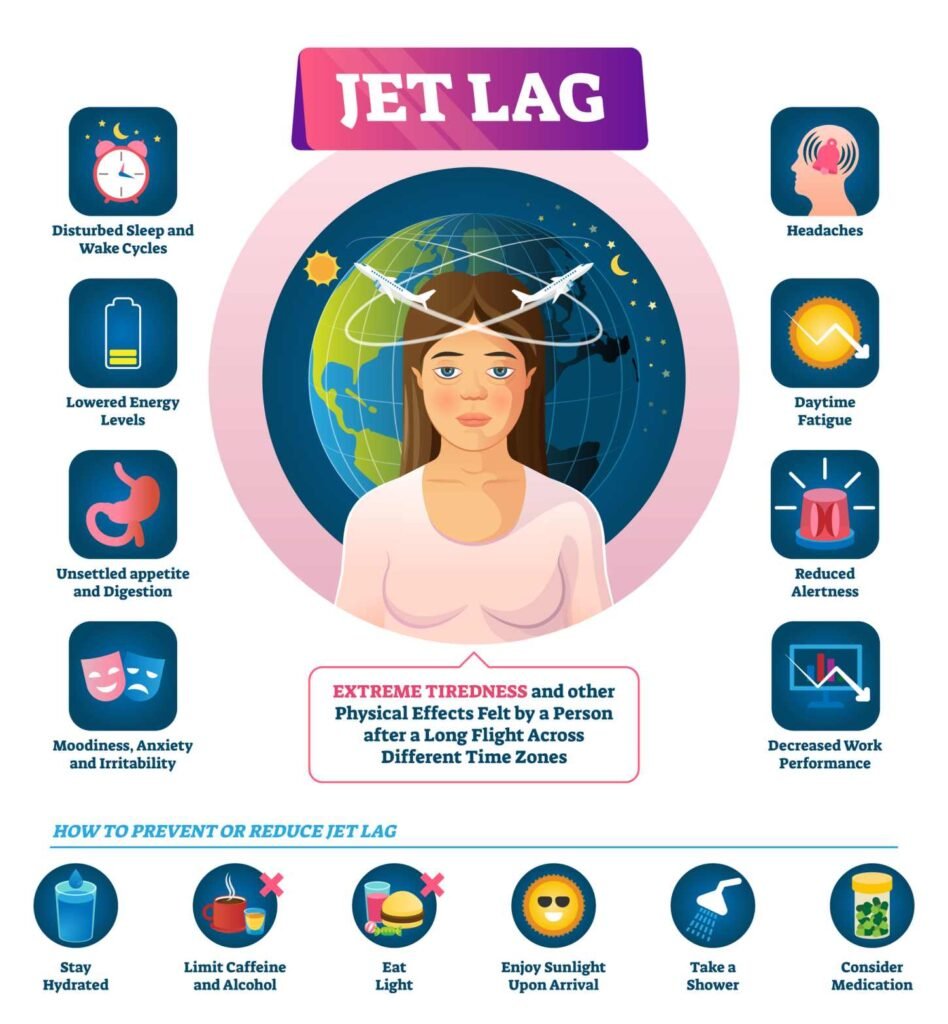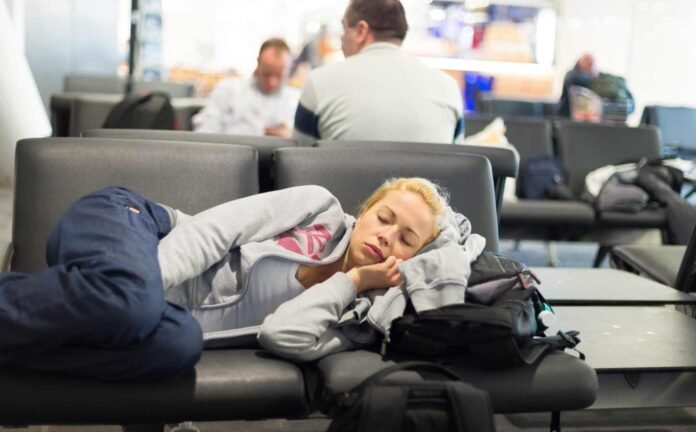Jet lag induced insomnia is a common problem for travelers who cross multiple time zones.
Jet lag occurs when the body’s internal clock, or circadian rhythm, is disrupted, causing symptoms such as fatigue, irritability, and difficulty sleeping. These symptoms can be exacerbated by the stress of travel, making it difficult for travelers to adjust to their new time zone and get the sleep they need.
One of the main causes of jet lag induced insomnia is the disruption of the body’s natural sleep-wake cycle. When traveling across multiple time zones, the body’s internal clock is thrown off, making it difficult to fall asleep and stay asleep at the appropriate times. This can lead to a variety of sleep problems, including difficulty falling asleep, waking up frequently during the night, and feeling groggy and unrefreshed in the morning.

Despite the challenges of jet lag induced insomnia, there are a number of strategies travelers can use to minimize its impact. These may include adjusting sleep schedules before travel, using light therapy to reset the body’s internal clock, and taking sleep aids or other medications to help promote sleep. By taking steps to manage jet lag induced insomnia, travelers can enjoy a more restful and productive trip, regardless of their destination.
Understanding Jet Lag
Defining Jet Lag Disorder
Jet lag disorder, also known as desynchronosis, is a temporary sleep disorder that occurs when a person travels across different time zones. This condition can affect anyone who travels across two or more time zones, especially if they travel in an eastward or westward direction. Jet lag disorder is caused by a mismatch between the body’s internal clock and the external environment.
The Science of Circadian Rhythms
Circadian rhythms are physical, mental, and behavioral changes that follow a roughly 24-hour cycle. These rhythms respond primarily to light and darkness in the environment. The body’s internal clock, located in the suprachiasmatic nucleus (SCN) of the hypothalamus, controls the timing of circadian rhythms.
Effects of Time Zone Changes on Sleep
Traveling across different time zones can disrupt the body’s internal clock, leading to jet lag disorder. The severity of jet lag symptoms depends on the number of time zones crossed, the direction of travel, and the individual’s circadian rhythm. Common symptoms of jet lag disorder include difficulty falling asleep, difficulty staying asleep, fatigue, daytime sleepiness, irritability, and gastrointestinal problems.
To minimize the effects of jet lag induced insomnia, experts recommend adjusting sleep and wake times gradually before and after travel, staying hydrated, avoiding alcohol and caffeine, and exposing oneself to natural light during the day. In severe cases, medication may be prescribed to help regulate sleep and wake times.
Overall, understanding the effects of time zone changes on sleep and the science of circadian rhythms can help individuals better manage jet lag disorder and travel fatigue.
Symptoms and Complications
Common Symptoms of Jet Lag
Jet lag induced insomnia can cause a range of symptoms that can vary in severity depending on the individual and the extent of their travel. Some common symptoms of jet lag include:
- Fatigue: Feeling tired and lacking energy is one of the most common symptoms of jet lag. It can make it difficult to concentrate and perform daily tasks.
- Mood changes: Jet lag can cause changes in mood, including irritability, anxiety, and depression.
- Headaches: Headaches are a common symptom of jet lag and can range from mild to severe.
- Daytime sleepiness: Jet lag can disrupt the body’s natural sleep-wake cycle, making it difficult to stay awake during the day.
- Insomnia: Difficulty falling asleep or staying asleep is a common symptom of jet lag.
- Gastrointestinal discomfort: Jet lag can cause gastrointestinal discomfort, including nausea, vomiting, and diarrhea.
- General malaise: Jet lag can cause a general feeling of discomfort and unease.
Potential Complications
While jet lag induced insomnia is usually a temporary inconvenience, it can sometimes lead to more serious complications. Some potential complications of jet lag include:
- Increased risk of accidents: Jet lag can impair cognitive function and reaction time, increasing the risk of accidents.
- Increased risk of illness: Jet lag can weaken the immune system, making individuals more susceptible to illness.
- Increased risk of mental health issues: Jet lag can exacerbate existing mental health conditions or contribute to the development of new ones.
- Increased risk of cardiovascular problems: Jet lag can disrupt the body’s circadian rhythm, which can increase the risk of cardiovascular problems such as heart disease and stroke.
It is important to note that not everyone will experience all of these symptoms or complications, and the severity of symptoms can vary from person to person. However, being aware of the potential risks and taking steps to minimize them can help individuals avoid the negative effects of jet lag induced insomnia.
Risk Factors and Prevention
Identifying Risk Factors
Jet lag induced insomnia can affect anyone who travels across multiple time zones, but certain individuals may be at a higher risk. Age is a significant factor, with older adults being more susceptible to jet lag symptoms. Additionally, individuals who frequently travel across time zones, such as frequent flyers and business travelers, are more likely to experience jet lag.
Other risk factors include poor sleep hygiene, dehydration, and pre-existing sleep disorders. Individuals who do not get enough sleep on a regular basis may have a harder time adjusting to a new time zone, while dehydration can exacerbate symptoms of jet lag. Pre-existing sleep disorders, such as sleep apnea, can also make it more difficult to adjust to a new sleep schedule.
Preventive Measures
There are several steps individuals can take to prevent or minimize the effects of jet lag induced insomnia. One of the most effective strategies is to adjust sleep schedules before traveling. This involves gradually shifting sleep and wake times to align with the destination time zone. This can help the body adjust more quickly to the new schedule.
Hydration is also crucial in preventing jet lag symptoms. Individuals should drink plenty of water before, during, and after the flight to avoid dehydration. Avoiding alcohol and caffeine can also help, as they can disrupt sleep and exacerbate jet lag symptoms.
Maintaining good sleep hygiene is another important preventive measure. This includes establishing a regular sleep schedule, avoiding screens before bedtime, and creating a comfortable sleep environment. Finally, individuals who frequently travel across time zones may benefit from seeking medical advice, such as medication or light therapy, to help regulate their sleep-wake cycle.
Treatment and Management
Immediate Treatment Options
The immediate treatment options for jet lag induced insomnia involve addressing the underlying sleep disturbance. Individuals can try to regulate their sleep-wake cycle by following a strict sleep schedule, avoiding caffeine and alcohol, and engaging in relaxation techniques. Additionally, there are several medications that can be used to help individuals fall asleep or stay asleep, including over-the-counter sleep aids and prescription medications.
Melatonin is a hormone that regulates the sleep-wake cycle and can be used to treat jet lag induced insomnia. It is available over-the-counter and can be taken in pill or liquid form. Light therapy is another treatment option that involves exposure to bright light to help regulate the sleep-wake cycle. This can be done using a light box or by spending time outdoors in natural sunlight.
Long-Term Management Strategies
Long-term management strategies for jet lag induced insomnia involve making lifestyle changes to improve sleep habits. This can include establishing a regular sleep schedule, avoiding caffeine and alcohol, and engaging in regular exercise. Supplements such as valerian root and chamomile can also be used to promote relaxation and improve sleep.
Cognitive behavioral therapy (CBT) is a type of therapy that can help individuals change negative thought patterns and behaviors that may be contributing to their insomnia. Resynchronization is another treatment option that involves adjusting the sleep-wake cycle to match the new time zone. This can be done by gradually adjusting sleep and wake times before and after travel.
In conclusion, there are several immediate treatment options and long-term management strategies available for individuals experiencing jet lag induced insomnia. It is important to consult with a healthcare professional before beginning any new treatment regimen.
Lifestyle Adjustments
Diet and Hydration
Maintaining a healthy diet and staying hydrated can help alleviate the symptoms of jet lag and insomnia. It is recommended to avoid consuming caffeine or alcohol, as they can disrupt sleep patterns and lead to dehydration. Instead, opt for water and herbal tea, which can help calm the nervous system and promote relaxation. Additionally, it is important to eat meals at regular intervals to keep the body’s internal clock in sync.
Exercise and Relaxation Techniques
Regular exercise can help combat the effects of jet lag and improve sleep quality. Engaging in physical activity during the day can help regulate the body’s circadian rhythm and promote feelings of tiredness at night. Relaxation techniques, such as yoga or meditation, can also be effective in reducing stress and promoting restful sleep.
Optimizing Sleep Environment
Creating a comfortable sleep environment can help promote restful sleep and combat the effects of jet lag. It is recommended to maintain a cool temperature in the bedroom, as a cooler environment can help promote deeper sleep. Additionally, using earplugs or an eye mask can help block out noise and light, leading to a more peaceful sleep. It is also important to ensure that the bed and pillows are comfortable and supportive.
By making simple lifestyle adjustments, such as maintaining a healthy diet, engaging in regular exercise, and optimizing the sleep environment, individuals can alleviate the symptoms of jet lag induced insomnia and promote restful sleep.
Travel Tips for Minimizing Jet Lag
Jet lag can be a frustrating experience for travelers, especially for those who frequently travel across time zones. It can disrupt sleep patterns, cause fatigue, and affect overall well-being. However, there are some strategies that can help minimize the effects of jet lag. Here are some travel tips:
Planning for Travel
- Choose flights that arrive at your destination during daylight hours. Exposure to natural light can help reset your body clock and reduce the effects of jet lag.
- If possible, avoid layovers or choose ones that are shorter in duration. Long layovers can prolong the travel time and make it harder to adjust to the new time zone.
- Adjust your sleep schedule a few days before the trip. If you are traveling westward, try to go to bed later than usual. If you are traveling eastward, try to go to bed earlier than usual.
During the Flight
- Stay hydrated by drinking plenty of water. Dehydration can worsen the effects of jet lag.
- Avoid caffeine and alcohol, as they can disrupt sleep patterns and contribute to dehydration.
- Try to sleep on the plane, especially if it aligns with the destination’s nighttime. Use earplugs, eye masks, and neck pillows to make sleep more comfortable.
Post-Arrival Strategies
- Try to adjust to the new time zone as soon as possible. If you arrive during the daytime, spend time outside in natural light to help reset your body clock.
- Avoid taking long naps during the day, as it can make it harder to fall asleep at night.
- If possible, plan your schedule to allow for a gradual adjustment to the new time zone. For example, if you are traveling eastward, plan to arrive a few days before any important meetings or events.
By following these travel tips, travelers can minimize the effects of jet lag and enjoy their trip to the fullest.
Frequently Asked Questions
What are effective treatments for jet lag-related insomnia?
There are several effective treatments for jet lag-related insomnia, including medication, light therapy, and relaxation techniques. Over-the-counter sleep aids such as melatonin and prescription medications such as benzodiazepines can help regulate sleep patterns. Light therapy involves exposure to bright light, which can help reset the body’s internal clock. Relaxation techniques such as yoga and meditation can also help reduce stress and promote better sleep.
How can one calculate the recovery time needed for jet lag?
The recovery time needed for jet lag varies depending on several factors, including the number of time zones crossed, the direction of travel, and individual factors such as age and health. A general rule of thumb is that it takes one day to recover for every time zone crossed. For example, if you cross six time zones, it may take up to six days to fully recover.
What strategies help in staying awake to overcome jet lag?
Several strategies can help in staying awake to overcome jet lag, including exposure to natural light, exercise, and staying hydrated. Exposure to natural light can help regulate the body’s internal clock and promote wakefulness. Exercise can also help increase alertness and reduce fatigue. Staying hydrated is also important, as dehydration can exacerbate symptoms of jet lag.
Why does jet lag often feel more intense after returning home?
Jet lag often feels more intense after returning home due to a phenomenon known as “social jet lag.” This occurs when the body’s internal clock is disrupted by changes in daily routines, such as meal times and sleep schedules. These changes can make it difficult to adjust to the new time zone, leading to more severe symptoms of jet lag.
Are there remedies to alleviate nausea associated with jet lag?
There are several remedies to alleviate nausea associated with jet lag, including ginger, peppermint, and acupressure. Ginger has been shown to reduce nausea and vomiting, while peppermint can help soothe an upset stomach. Acupressure, which involves applying pressure to specific points on the body, can also help alleviate nausea.
How long is jet lag-induced insomnia expected to last?
Jet lag-induced insomnia can last anywhere from a few days to several weeks, depending on individual factors such as age and health. However, most people typically recover within a few days to a week. To help alleviate symptoms, it is important to maintain a regular sleep schedule, avoid caffeine and alcohol, and engage in relaxation techniques such as meditation and deep breathing.
Understanding Circadian Rhythm: The Body’s Natural Clock Explained

Circadian rhythms are physical, mental, and behavioral changes that follow a roughly 24-hour cycle, responding primarily to light and darkness in an organism’s environment. These rhythms are driven by an internal biological clock, which is known as the circadian clock or the biological clock.
Continue reading: Understanding Circadian Rhythm
Discover the Tongue Trick for Better Sleep: The U.S. Marine’s Secret

This tongue trick is designed to help you fall asleep in just two minutes by stimulating a specific nerve in your tongue, known as the “sleep nerve,” to promote relaxation and better sleep.
Continue reading: Discover the Tongue Trick for Better Sleep





